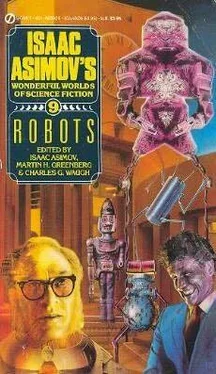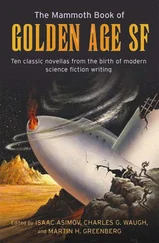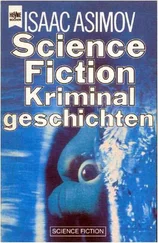Frederik Pohl - Isaac Asimov's Worlds of Science Fiction. Book 9 - Robots
Здесь есть возможность читать онлайн «Frederik Pohl - Isaac Asimov's Worlds of Science Fiction. Book 9 - Robots» весь текст электронной книги совершенно бесплатно (целиком полную версию без сокращений). В некоторых случаях можно слушать аудио, скачать через торрент в формате fb2 и присутствует краткое содержание. Год выпуска: 1989, ISBN: 1989, Издательство: Robinson Publishing, Жанр: Фантастика и фэнтези, на английском языке. Описание произведения, (предисловие) а так же отзывы посетителей доступны на портале библиотеки ЛибКат.
- Название:Isaac Asimov's Worlds of Science Fiction. Book 9: Robots
- Автор:
- Издательство:Robinson Publishing
- Жанр:
- Год:1989
- ISBN:ISBN: 1-85487-041-6
- Рейтинг книги:4 / 5. Голосов: 1
-
Избранное:Добавить в избранное
- Отзывы:
-
Ваша оценка:
- 80
- 1
- 2
- 3
- 4
- 5
Isaac Asimov's Worlds of Science Fiction. Book 9: Robots: краткое содержание, описание и аннотация
Предлагаем к чтению аннотацию, описание, краткое содержание или предисловие (зависит от того, что написал сам автор книги «Isaac Asimov's Worlds of Science Fiction. Book 9: Robots»). Если вы не нашли необходимую информацию о книге — напишите в комментариях, мы постараемся отыскать её.
Isaac Asimov's Worlds of Science Fiction. Book 9: Robots — читать онлайн бесплатно полную книгу (весь текст) целиком
Ниже представлен текст книги, разбитый по страницам. Система сохранения места последней прочитанной страницы, позволяет с удобством читать онлайн бесплатно книгу «Isaac Asimov's Worlds of Science Fiction. Book 9: Robots», без необходимости каждый раз заново искать на чём Вы остановились. Поставьте закладку, и сможете в любой момент перейти на страницу, на которой закончили чтение.
Интервал:
Закладка:
The same information was sent to. Saenger. With the message from Plato that the first step of the scenario was less then eleven months away.
Saenger prepared himself for the coming explosion. It sent out small automatic probes to ring the star at various distances. One of them it sent on an outward orbit. It was to witness the destruction of Saenger before it, too, was vaporized by the unloosed energies of the star.
One of the problems they had working with Plato was that he was not human. So, then, neither were any of the other SSIs budded off Plato. Of which Saenger was one. Humans had made Plato, had guided it while it evolved its own brand of sentience.
They had done all they could to guide it along human thought patterns. But if it went off on some detour which brought results, no matter how alien the process, they left it to its own means.
It had once asked for some laboratory animals to test to destruction, and they had said no. Otherwise, they let Plato do as it pleased.
They gave a little, they took a little while the intelligence grew within its deep tunnels in the Moon. What they eventually got was the best mind man could ever hope to use, to harness for his own means.
And as Plato had been budded off the earlier, smaller Socrates, they were preparing a section of Plato for excision. It would be used for even grander schemes, larger things. Aristotle's pit was being excavated near Tycho.
That part of Plato concerned with such things was quizzical. It already knew it was developing larger capacities, and could tackle a few of the problems for which they would groom Aristotle. In a few years, it knew it might answer them all, long before the new mass had gained its full capacity.
But nobody asked it, so it didn't mention it.
Not maliciously, though. It had been raised that way.
Thousands of small buds had already been taken off Plato, put in stations throughout the solar system, used in colonization, formed into the Snapshot system, used for the brains of exploratory ships.
Saenger was one of those.
"Plato." ?
"I have a problem."
" ":- amp; amp;(')*
"What can I do? Besides that?"
— - - - - - - - - amp; (:) (:) x @ ј. 7v SQR(X3)
"Then what?"
— - - - - D = RT. x, x, «= - 1
"Do go on."
— - - - - C2; C2 -1/10 r SQR(t)
"Saenger is talking to Plato a lot, Sondra."
"A lot? How much is a lot?"
"I saw some discards yesterday, had Saenger's code on it. Thought they were from the regular run. But I came across the same thing this morning, before the Snapshot encoding. So it couldn't have been on regular transmission."
"And…?" asked Sondra.
"And I ran a capacity trace on it. Saenger used four ten-billionths of Plato's time this morning. And yesterday, a little less."
She drummed her fingers on the desk. "That's more than ten probes should have used, even on maintenance schedules. Maybe Plato is as interested as we are in supernovae?"
"What Saenger gave us was pretty complete. There's not much he could tell Plato he didn't tell us."
"Want to run it on playback?" asked Sondra.
"I'd rather you asked Saenger yourself," said the man. "Maybe they just exchanged information and went over capacity."
Sondra Maxell took off her earphones. "Uchi, do you think Saenger knows it's going to die?"
"Well, it knows what 'ceasing to function' is. Or has a general idea, anyway. I don't think it has the capacity to understand death. It has nothing to go by."
"But it's a reasoning being, like Plato. I…" She thought a moment. "How many of Plato's buds have ceased to function?"
"Just the one, on the Centauri rig."
"And that was quick, sudden, totally unexpected?"
"The crew and the ship wiped out in a couple of nanoseconds. What…?"
"I think, Uchi, that this is the first time one of Plato's children knows it's going to die. And so does Plato."
"You mean it might be giving Saenger special attention, because of that?"
"Or Saenger might be demanding it."
Uchi was silent.
"This is going to be something to see," he said, finally.
"Saenger, what have you been talking to Plato about?"
"The mechanics of the shock wave and the flux within the star's loosened envelope. If you would like, I could printout everything we've discussed."
"That would take months, Saenger."
"No matter then, Dr. Maxwell. I have a question."
"Yes?"
"Could I move further away from this star? The resolution of my instruments won't be affected up to point 10.7 AU. I could station a probe in this orbit. I thought you might get a better view and data if I were further out."
Sondra was quiet. "Saenger," she said, "you know you can't possibly get away from the shock, no matter how far you move on your ion engines?"
"Yes, Doctor."
"And that you can't get to ramming speed, either?"
"Yes," said Saenger.
"Then why are you trying to move further away?"
"To give you a better view," said the ship. "Plato and I figured the further away the more chance of getting valuable information I would have. I could telemeter much more coordinated data through Snapshot. The new programming is not specific about the distance of the ship, only of the probes."
Sondra looked at Uchi. "We'll ask the Committee. I don't think there'll be any real objections. We'll get back to you ASAP."
"Saenger out."
Off that star was black, and the light was so bright on the sunward side that all Saenger's screens had to be filtered down to No. 3.
The sun still appeared as a red giant in the optics, burning brighter than when Saenger docked around it. But Saenger had other eyes that saw in other waves. His neutrino grids saw the round ball of the star and its photosphere, but deep inside it detected a glowing cone, growing larger and more open each day, rooted down inside the atmosphere of the sun. The helium flash was not far away.
Already Plato had revised his figures again. He had little more than seven months before the star blew like a cosmic steam boiler, giving men the first close look at an event they had not seen before.
The star would cover the whole sunward sky, its shell would expand, covering everything for millions of myriameters with the screaming remnants of its atmosphere.
Saenger had no margin of safety.
He did not have time, or the proper materials, or anything.
He was monitoring himself and his worker robots as he moved outward on his reaction engines. He had swung out of the orbit as soon as the Committee had given permission.
His robots moved in and out through the airlocks and the open sides of the ship.
One of them, using a cutting laser, sawed through its leg and went whirling away on a puff of soundless force. These robot were never made to work outside the ship.
If Saenger could have, he would have said the word damn.
"Plato?" ?
"There's not enough material in the ship unless I cannibalize my shielding." » «"
"But that would defeat the whole purpose."
*?
"How could I?"
X (:) amp; - - - -) (') (- -
"Hey! Why didn't I think of that!"
amp;"*()
"But they'll know as soon as I do." ?* (:)(:) amp; - - -?
"Well…"
"Now he's using his scoops," said Sondra as she monitored the Snapshot encoding for the day. "What in the hell is going on out there?"
"It's not interfering with the monitoring programs. He's sent out two more remote monitors. And the activity down there is picking up."
"He's backed off on his use of Plato. Way below normal, in fact. Do you think we ought to have him dump his grids now?" she asked;
"You're the boss," said Uchi. "I'd get as much information as we could first. He may find something in those last three minutes we don't know about."
"Has Plato contacted him?" asked Sondra. "Hmmm. Not lately."
Читать дальшеИнтервал:
Закладка:
Похожие книги на «Isaac Asimov's Worlds of Science Fiction. Book 9: Robots»
Представляем Вашему вниманию похожие книги на «Isaac Asimov's Worlds of Science Fiction. Book 9: Robots» списком для выбора. Мы отобрали схожую по названию и смыслу литературу в надежде предоставить читателям больше вариантов отыскать новые, интересные, ещё непрочитанные произведения.
Обсуждение, отзывы о книге «Isaac Asimov's Worlds of Science Fiction. Book 9: Robots» и просто собственные мнения читателей. Оставьте ваши комментарии, напишите, что Вы думаете о произведении, его смысле или главных героях. Укажите что конкретно понравилось, а что нет, и почему Вы так считаете.









